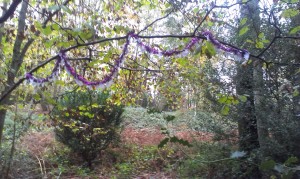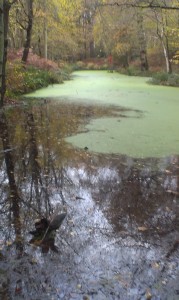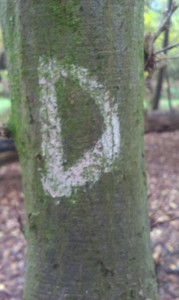I originally published this article in 2014, but I think it bears repeating, especially, if Sir Geoffrey honours the tradition and makes his once-every- six-year reappearance this Christmas…
If you have a few hours to spare this Sunday you could do worse than wander up to Southgate, sit for a few moments on the tube or bus to Cockfosters, and take a wander around the beautiful undulating and Repton designed grounds of Trent Park, once part of the Royal Hunting Forests of Enfield Chase. Head past the café on the path that goes north of the lake and you will eventually come to the mysterious green waters of Camlet Moat, a scheduled ancient monument.

It may be centuries old but the C shaped enclosure, full of ancient trees, has a kind of unknowable life of its own, with letters carved into trees, charms and tokens wedged and tied into the branches, and tinsel and streamers laid over the limbs of the ancient trees. Druids say that it’s a spiritual place, where one can experience the earth’s energy. It’s certainly eerie as the low winter sun slowly sinks and the shadows grow longer, a place where anything might happen.
But our story begins, not in Enfield, but in Egypt in 1923 when manicured socialite Sir Philip Sassoon was invited by Lord Carnarvon and Harold Carter to witness the opening of the tomb of Tutankhamun. Returning home, unaffected by the famous curse of King Tut but excited by the prospect of hidden treasure, Sassoon’s thoughts turned to the ancient monument on his own property, Trent Park, where he regularly entertained the likes of Charlie Chaplin, Rex Whistler, and George Bernard Shaw in tasteful opulence. Before many months had passed, Sassoon’s team had started to dig.
Camlet had for some centuries been reputed to have been the home of Sir Geoffrey Mandeville, the first Earl of Essex and Constable of the Tower of London, though some say it was first the home of King Arthur. In ancient times it was right at the centre of the Royal Forest: the moat made it capable of defence, and so Camlet was ideally placed to manage and police the forest. The earliest records show that permission was granted to crenelate an existing house on the site in 1347, but that the house was demolished 100 years later so that the materials could be sold to pay for renovations to Hertford Castle.

And so, Sassoon drained the moat while the locals watched and waited.
Within a little while, the remains of a huge drawbridge were found, and a long wall, in some places 5 feet thick, plus Roman sandals, ancient daggers and horseshoes. Remarkable though these finds were, press reports soon began to focus not so much on the finds, but of the risk of disturbing the ghost of Sir Geoffrey Mandeville, who, as legend had variously described it, had buried treasure under the paved bottom of a well on the site to keep it from his many enemies or alternatively had fallen in with his treasure and drowned, his spirit lingering to ensure its eternal protection. The remains of an ancient well were indeed found, in the north east corner of the area enclosed by the moat.
Well might the naysayers have worried.
There were no sightings during this excavations, but this may have been because Geoffrey had apparently forgotten about his treasure – perhaps his hard currency was no good in the spirit world – and flounced off. According to a local writer calling himself the Philanderer, he had moved to East Barnet, first to a stable, which was unfortunately then pulled down by the council, and then to the house of Nora O Callahan and her sister, where he set to terrorising them by knocking on the door, thumping around, rattling their letterbox and generally terrifying their normally fearless dog. Next, he was seen by persons unrecorded, in full regalia of red cloak and spurs.
The national press descended, and by all accounts, Barnet became a place of ghost hunting bedlam and police had to be brought in to regulate the traffic. One William Stutters complained of the racket that Sir Geoffrey was making and warned that local building work was waking the dead. Paranormal activity was now also bedeviling the building which is today the Prince of Wales pub. Curiously though, by 1930 the Philanderer was saying that Sir Geoffrey was back stalking around Cockfosters at Christmas time though in December 1932 he was seen in full armour in East Barnet by the members of the local psychic research society, which was lucky, because they just happened to be staking the place out at midnight. By this time, it was being said that Sir Geoffrey made an appearance on Christmas Eve every six years.

Sightings of Sir Geoffrey have continued intermittently, though they haven’t occurred at 6 year intervals as specified or even in the same place – he has been spotted in Hadley Woods and at East Barnet church. If the legend is correct, he is next due to appear at Christmas in 2016. Who knows where he will have moved to by then?
If your interest is piqued by the story of Sir Geoffrey, do read Jennie Lee Cobban’s brilliant, hilarious and entertaining Geoffrey de Mandeville and London’s Camelot. Currently out of print but available in libraries.*
This article originally appeared in the December 14 issue of Palmers Green and Southgate Life
*Addendum – new edition available at Barnet museum.